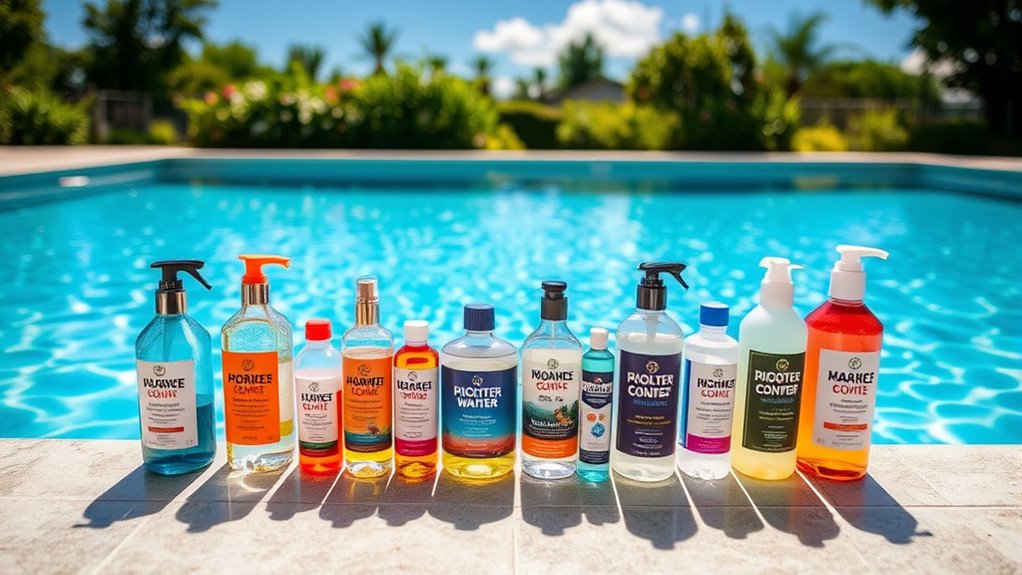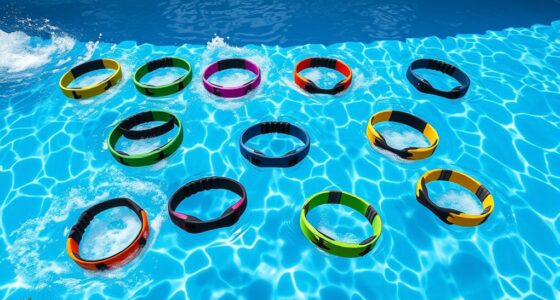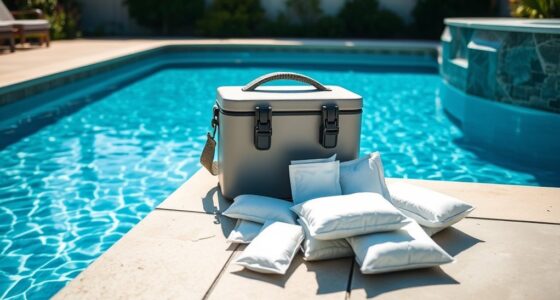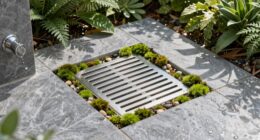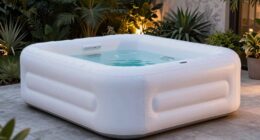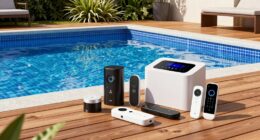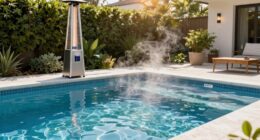Pool water conditioners are vital for maximizing chlorine efficiency and maintaining stable water conditions. They primarily use cyanuric acid (CYA) to protect chlorine from degradation by sunlight, allowing it to sanitize effectively. Ideal CYA levels range from 20-50 ppm, ensuring consistent chlorine residual and reducing annual chlorine consumption. However, over-stabilization can hinder chlorine effectiveness, making regular monitoring essential. By understanding these dynamics, you can keep your pool healthy and balanced. There’s even more to explore on this topic!
Key Takeaways
- Water conditioners, primarily containing cyanuric acid, stabilize chlorine and enhance its effectiveness in pool sanitation.
- Cyanuric acid protects chlorine from UV degradation, ensuring it remains active longer in sunlight.
- Ideal CYA levels of 20-50 ppm help maintain chlorine efficiency while minimizing loss.
- Regular testing is essential, as excessive CYA can hinder chlorine’s effectiveness and complicate water balance.
- Using water conditioners can reduce chlorine consumption by up to 25%, promoting better pool health and sanitation.
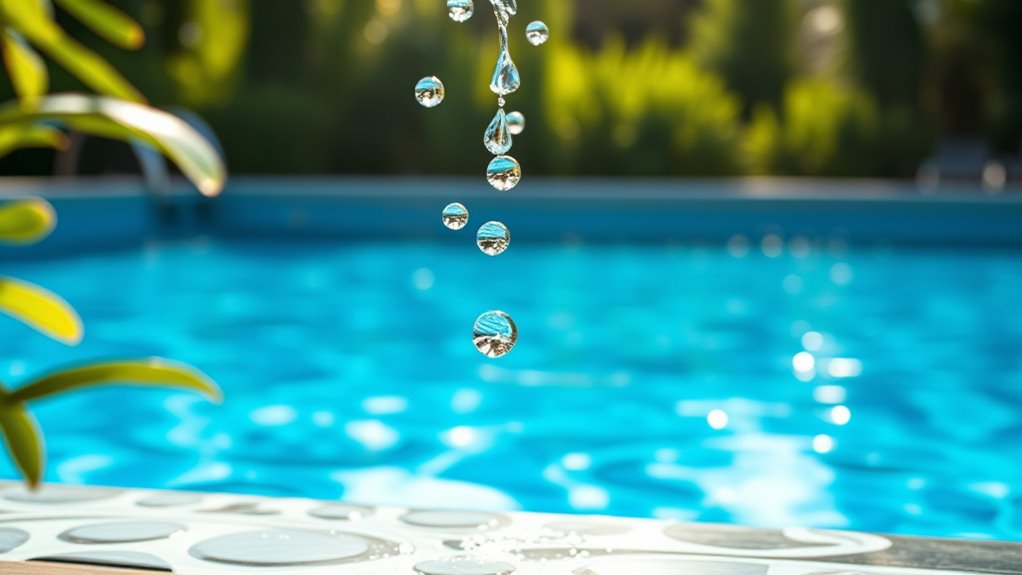
When it comes to maintaining your pool, using a water conditioner is fundamental for guaranteeing ideal chlorine efficiency. These conditioners primarily serve to protect chlorine from degradation caused by sunlight, allowing it to function effectively in sanitizing your pool water. The main active ingredient in most pool conditioners is cyanuric acid (CYA), which is also known as stabilizer or conditioner. By stabilizing chlorine, CYA considerably reduces its loss due to harmful UV rays, leading to more efficient chlorine use.
Using a water conditioner is essential for maximizing chlorine efficiency and protecting it from sunlight degradation.
Cyanuric acid plays a significant role in your pool’s chemistry. It not only protects chlorine but also acts as a pH buffer, contributing to total alkalinity and helping maintain stable water conditions. This interaction between CYA and chlorine forms a more stable complex that resists breakdown by sunlight, guaranteeing that your chlorine remains effective for longer periods.
You’ll want to keep the cyanuric acid concentration between 20-50 parts per million (ppm) for ideal results. A common dosage to achieve this is about 1 pound of conditioner for every 4,000 gallons of water, which can increase CYA levels by 30 ppm.
Using a water conditioner offers several benefits, including reduced chlorine consumption, which can be as much as 25% annually. By stabilizing chlorine, conditioners help maintain a continuous chlorine residual in your pool, fundamental for effective sanitation.
However, it’s essential to recognize that while CYA stabilizes chlorine, it can also decrease the chlorine’s reaction speed. Regular testing is crucial to guarantee CYA levels stay within that ideal range, as too much can lead to decreased chlorine effectiveness and increased reliance on acid.
You’ll want to adjust CYA levels as they can build up over time, especially if you’re adding stabilizers each season. Adding stabilizers in the spring can enhance chlorine’s effectiveness throughout the warmer months, contributing to better overall pool health.
It’s critical to strike a balance, as over-stabilization can lead to complications.
Frequently Asked Questions
How Often Should I Add Pool Water Conditioner?
You should add pool water conditioner when you first fill your pool to establish proper levels.
After that, you typically won’t need to reapply it frequently unless you lose a significant amount of water—around 25% or more.
It’s a good idea to test your CYA levels every few months, especially during warmer months with high UV exposure, to guarantee your chlorine remains effective and to maintain ideal pool conditions.
Can I Use Multiple Types of Conditioners Simultaneously?
Imagine tossing a handful of different colors into a paint can; you’ll end up with a muddy mess.
Using multiple conditioners simultaneously can lead to imbalanced water chemistry and cloudy water. You’ll want to think carefully about compatibility before mixing.
Instead, stagger your additions and allow time for each to blend. Keeping your pool pump running will help disperse the chemicals evenly and keep your water clear and inviting.
Are Pool Water Conditioners Safe for Pets?
Are pool water conditioners safe for pets? It really depends on how you manage them.
While these conditioners can keep your pool clean and minimize harmful bacteria, improper dosing can harm your pets. You’ll need to monitor chemical levels closely and guarantee your pets don’t ingest pool water.
After swimming, rinse them off to reduce skin irritation and dry coats. Always keep an eye on your pets around the pool for their safety.
Do Conditioners Affect Pool Water Chemistry Significantly?
Ever wonder how a little bit of magic can keep your pool sparkling?
Conditioners do affect pool water chemistry, but not in drastic ways. They mainly help stabilize chlorine levels, ensuring it lasts longer against the sun’s rays.
While they contribute to total alkalinity, you need to keep their concentrations in check. If you overdo it, you might end up with water issues, so balance is key for a healthy swimming environment.
Can I Use Conditioner in Saltwater Pools?
Yes, you can use conditioner in saltwater pools!
In fact, it’s beneficial for stabilizing chlorine levels generated by your saltwater system. Using a conditioner helps maintain balanced pH and alkalinity, enhancing your pool’s overall performance.
It can also prevent scale buildup and minimize maintenance needs, making your swimming experience more enjoyable.
Just guarantee the conditioner you choose is compatible with your pool’s unique requirements for the best results.
Conclusion
In summary, understanding pool water conditioners helps you maintain clarity, guarantees safety, and enhances enjoyment. By balancing chemicals, preventing algae growth, and reducing maintenance, you create a welcoming oasis. So, invest in quality conditioners, embrace regular testing, and enjoy a sparkling pool. Remember, a well-conditioned pool isn’t just about looks; it’s about health, happiness, and harmony. Immerse yourself in the science, appreciate the benefits, and make every swim a revitalizing experience!
